Complete Guide to Reference Check Questions and Answers
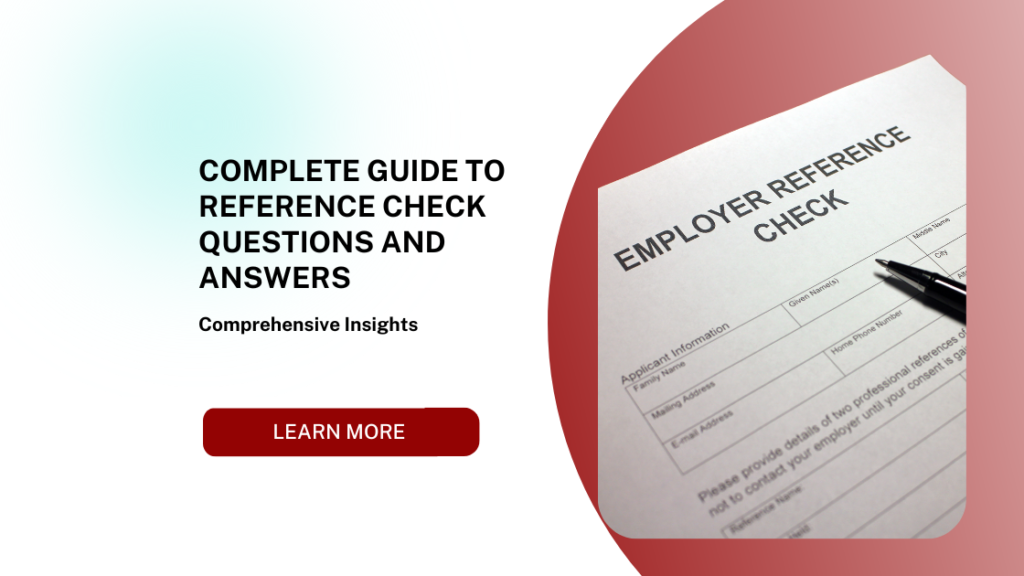
Introduction and Overview of Reference Check Questions
What Are Reference Checks and Why Are They Important?
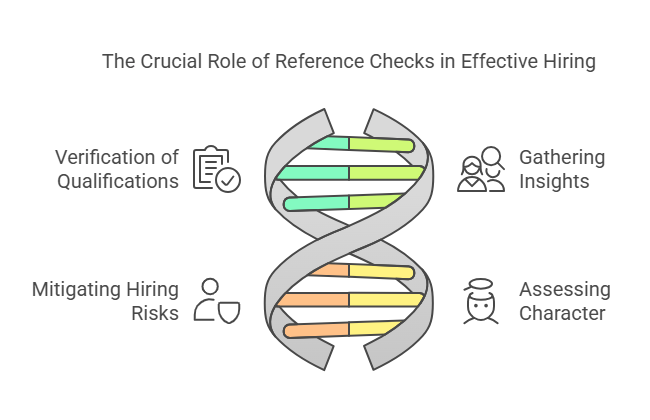
In the hiring process, reference checks play a crucial role in verifying the qualifications and abilities of potential candidates. When employers or hiring managers conduct reference checks, they seek to gather third-party insights into a candidate’s previous work experiences, skills, behavior, and overall suitability for the role. These checks typically involve contacting individuals who have worked closely with the candidate, such as former employers, colleagues, or supervisors, to get a more comprehensive view of the candidate’s qualifications and personal traits.
Reference checks are essential because they offer a level of confirmation about a candidate’s history that goes beyond what is provided in a resume or job interview. They help mitigate hiring risks by ensuring that the candidate has the necessary experience and skills to perform the job effectively. Additionally, they provide an opportunity to assess the candidate’s character, work ethic, and how they collaborate with others.
The Importance of Asking the Right Questions During Reference Checks
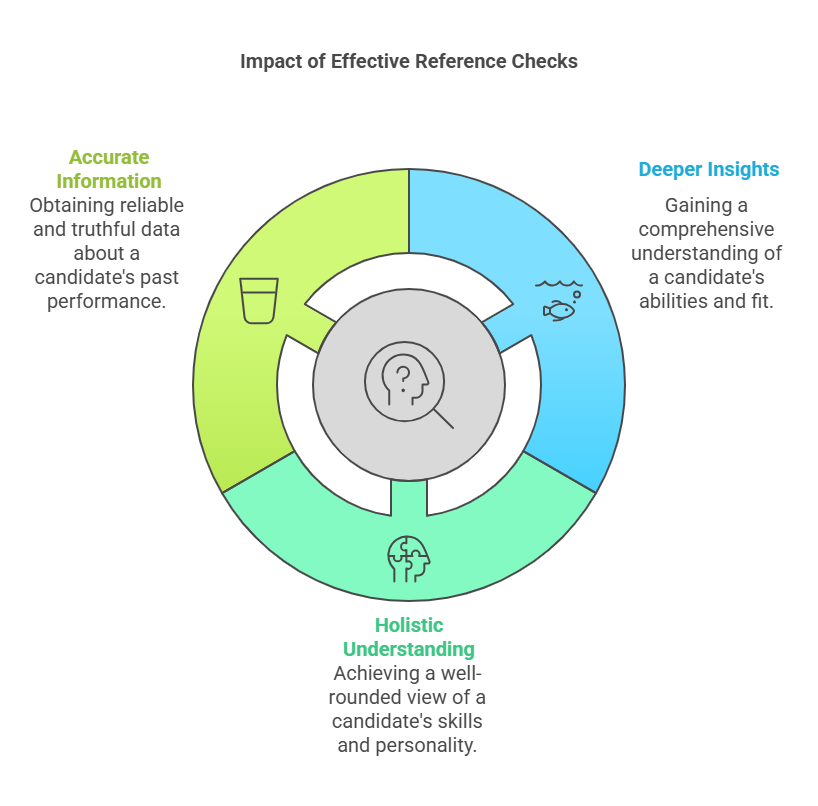
While reference checks are valuable, they are only effective if the right questions are asked. Asking irrelevant or poorly structured questions can result in incomplete or inaccurate information. On the other hand, asking insightful and well-thought-out questions can provide deeper insights into a candidate’s strengths, weaknesses, and suitability for a particular role.
Effective reference check questions should be aligned with the key skills and competencies required for the job. They should also address the candidate’s past performance, interpersonal skills, and overall demeanor in the workplace. By asking the right questions, employers can get a more holistic understanding of a candidate’s capabilities and determine whether they are the right fit for the organization.
Essential Reference Check Questions for Employers
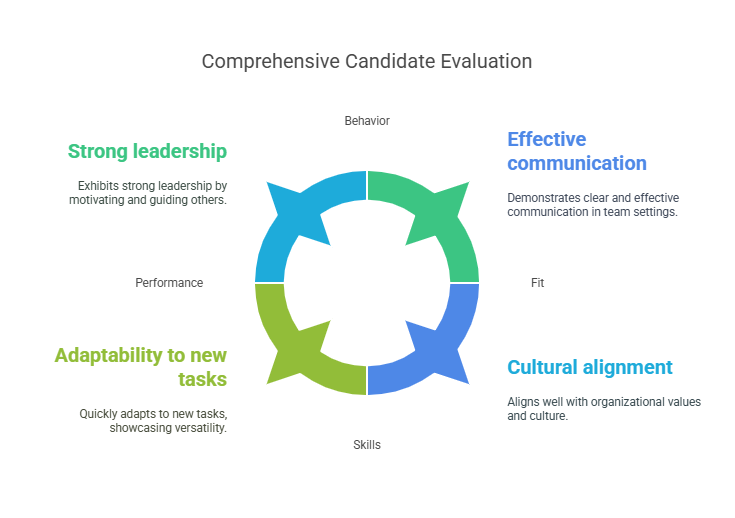
To help guide the reference check process, we’ve compiled a list of essential questions that employers should consider asking. These questions are categorized for clarity, based on various areas of assessment that are important for evaluating a candidate’s qualifications and character:
- General Work Performance Questions:
- Can you describe the candidate’s role and responsibilities while working with your company?
- How would you rate the candidate’s overall performance during their tenure with your organization?
- What strengths did you observe in the candidate’s work?
- Skills and Qualifications:
- Did the candidate have the necessary skills and experience to perform the job effectively?
- How well did the candidate adapt to new tasks or challenges in their role?
- Can you provide examples of how the candidate demonstrated problem-solving or critical thinking skills in their work?
- Work Ethic and Reliability:
- Was the candidate punctual and dependable? Did they meet deadlines consistently?
- Did the candidate take initiative in their role, or did they require close supervision?
- How did the candidate handle stressful situations or tight deadlines?
- Interpersonal Skills and Teamwork:
- How did the candidate interact with their colleagues and supervisors?
- Can you describe the candidate’s communication style? Were they clear and effective in conveying information?
- How well did the candidate work in a team environment? Did they collaborate effectively with others?
- Leadership and Management (if applicable):
- If the candidate held a leadership or managerial role, how did they manage their team?
- Did the candidate demonstrate strong leadership qualities, such as motivating others, providing guidance, and making decisions?
- Can you provide an example of how the candidate handled conflict or managed difficult situations with team members?
- Behavioral and Cultural Fit:
- How would you describe the candidate’s work style and personality?
- Do you believe the candidate aligns well with your organization’s values and culture?
- What areas of improvement did you identify for the candidate during their time with your company?
- Reason for Leaving:
- Why did the candidate leave your organization?
- Would you consider rehiring the candidate in the future? Why or why not?
These questions are designed to give hiring managers a comprehensive understanding of the candidate’s qualifications, behavior, and potential fit within the team. They address different facets of the candidate’s work history, from job performance to interpersonal dynamics, and provide insights that are crucial for making an informed hiring decision.
How These Questions Help Evaluate a Candidate’s Suitability for the Role
Asking well-crafted reference check questions helps employers assess a candidate’s qualifications in multiple dimensions. For instance, questions about work performance and skills provide concrete evidence of the candidate’s abilities in their previous roles, while questions related to interpersonal skills and teamwork offer insights into how the candidate may fit within your company’s culture.
In addition to verifying qualifications, reference checks also help employers uncover potential red flags, such as performance issues, behavioral concerns, or challenges that may not have been disclosed during interviews. This added layer of evaluation ensures that hiring decisions are based on a full and accurate understanding of the candidate’s background.
By utilizing reference check questions strategically, employers can gain valuable information that may not be readily apparent from a resume or interview alone, ultimately leading to more successful and informed hiring decisions.
Benefits of Conducting Reference Checks
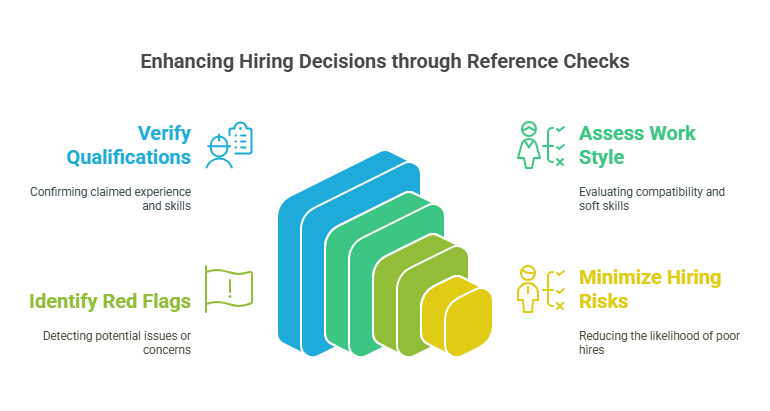
Reference checks provide numerous benefits to employers looking to hire the right candidate for the job. Here are some of the key advantages of conducting thorough reference checks:
- Minimizing Hiring Risks: One of the most significant benefits of reference checks is the ability to reduce hiring risks. Even the most polished resumes or interviewees can have gaps or exaggerations in their work history. Reference checks provide an additional layer of verification, confirming that the candidate has the experience and qualifications they claim. By speaking to previous employers or colleagues, you can confirm the candidate’s past job performance and reliability, minimizing the likelihood of making a poor hiring decision.
- Verifying Qualifications and Experience: While resumes and interviews can showcase a candidate’s qualifications, reference checks provide an independent confirmation. By reaching out to former supervisors, managers, or colleagues, you can verify the candidate’s job titles, responsibilities, and achievements, ensuring that the candidate’s claims align with the reality of their past roles. This helps avoid situations where a candidate may overstate their experience or expertise.
- Assessing Work Style and Compatibility: Reference checks also offer valuable insights into a candidate’s work style and how they may fit into your organization. A candidate might impress during interviews, but understanding how they work with others, their communication skills, and their ability to meet deadlines is crucial. References can shed light on these soft skills, offering a more complete picture of the candidate’s overall fit.
- Uncovering Red Flags: Reference checks help uncover potential red flags that might not come up during interviews or in the resume. A candidate’s previous employer might reveal issues with tardiness, performance, or even personality conflicts. While it’s important to maintain objectivity, reference checks help identify issues that could be detrimental to your organization in the long run.
- Improving Retention: By ensuring that the candidate is a strong cultural and professional fit through reference checks, you’re more likely to improve retention rates. Hiring someone whose work style, values, and skills align with your organization’s needs and culture reduces the chances of turnover, saving time and money in the long run.
Best Practices for Structuring and Conducting Effective Reference Checks
To fully benefit from reference checks, it’s important to follow best practices when conducting them. Here are some tips to ensure that your reference check process is effective and efficient:
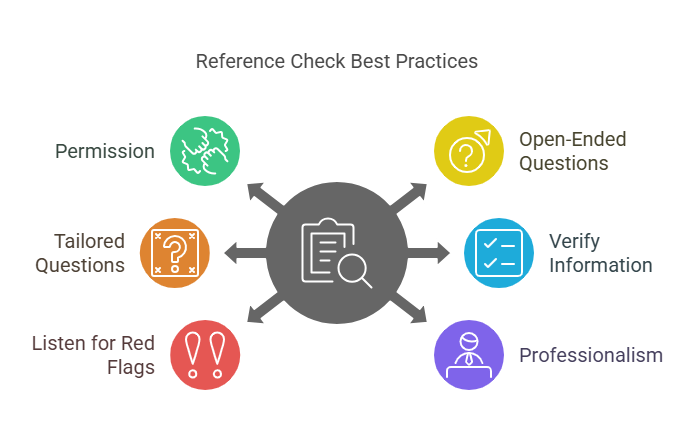
- Seek Permission Before Reaching Out to References: Always obtain the candidate’s permission before contacting their references. This not only ensures that the candidate is comfortable with your inquiry but also fosters transparency and trust in the hiring process.
- Ask Open-Ended Questions: Open-ended questions encourage references to provide more detailed answers, rather than simple “yes” or “no” responses. This allows you to gather more comprehensive insights into the candidate’s abilities, strengths, and areas for improvement. For example, instead of asking, “Was the candidate reliable?” ask, “Can you describe the candidate’s reliability and how they managed their workload?”
- Tailor Questions to the Role: Depending on the position the candidate is being considered for, tailor your reference check questions to evaluate the specific skills required for the role. For instance, if you are hiring for a leadership role, focus on questions related to management experience, team leadership, and decision-making abilities.
- Verify Key Information: Use the reference check as an opportunity to confirm key facts, such as the candidate’s job title, dates of employment, and responsibilities. Cross-checking this information with the candidate’s resume or application can help you catch any discrepancies.
- Listen for Red Flags: Pay attention to any hesitation or reluctance from references. If a reference avoids answering specific questions or provides vague responses, this could be a red flag that warrants further investigation. Be sure to probe deeper if needed.
- Remain Professional and Objective: Keep the reference check conversation professional and respectful. Your goal is to gather information that will help you make an informed decision, not to criticize the candidate. Keep the tone neutral and objective throughout the process, avoiding personal opinions or biases.
- Document Your Findings: Take thorough notes during the reference check process. Documenting your findings helps ensure that you remember key insights later and provides a record of your evaluation process. These notes may also be useful if you need to revisit the reference check at any point in the future.
- Avoid Discriminatory Questions: Be mindful of legal and ethical considerations when conducting reference checks. Avoid asking questions that could be seen as discriminatory, such as those related to age, gender, race, marital status, or religious beliefs. Stick to job-relevant questions to ensure compliance with employment laws.
Our Services: Supporting Efficient and Compliant Reference Checks
At Exact Background Checks, we understand the importance of conducting thorough and compliant reference checks. Our services are designed to help employers make informed, risk-free hiring decisions by providing accurate and timely reference check reports.
We offer a range of background check solutions tailored to meet your organization’s needs, including:
- Comprehensive Reference Check Services: We conduct detailed reference checks, reaching out to the candidate’s previous employers, colleagues, and other professional contacts. Our experienced team ensures that all relevant aspects of the candidate’s work history and performance are thoroughly assessed.
- Customizable Reference Check Questionnaires: Our services include customizable reference check questionnaires that allow you to focus on the specific skills and competencies relevant to the role you’re hiring for. This ensures that your reference check process is aligned with your hiring needs.
- Compliance Assurance: We prioritize compliance with all relevant laws and regulations, including data privacy and non-discrimination rules. Our services are designed to ensure that your reference checks are conducted ethically and legally, minimizing the risk of legal challenges down the road.
- Timely and Accurate Reports: We provide detailed, easy-to-read reference check reports that summarize key insights and feedback. Our team ensures that you receive accurate information in a timely manner, allowing you to make faster and more informed hiring decisions.
By utilizing our services, you can streamline your reference check process, reduce the risk of hiring mistakes, and ultimately build a more qualified and reliable workforce. Visit exactbackgroundchecks.com to learn more about how we can support your reference check needs and help you hire with confidence.
Legal and Ethical Considerations When Conducting Reference Checks
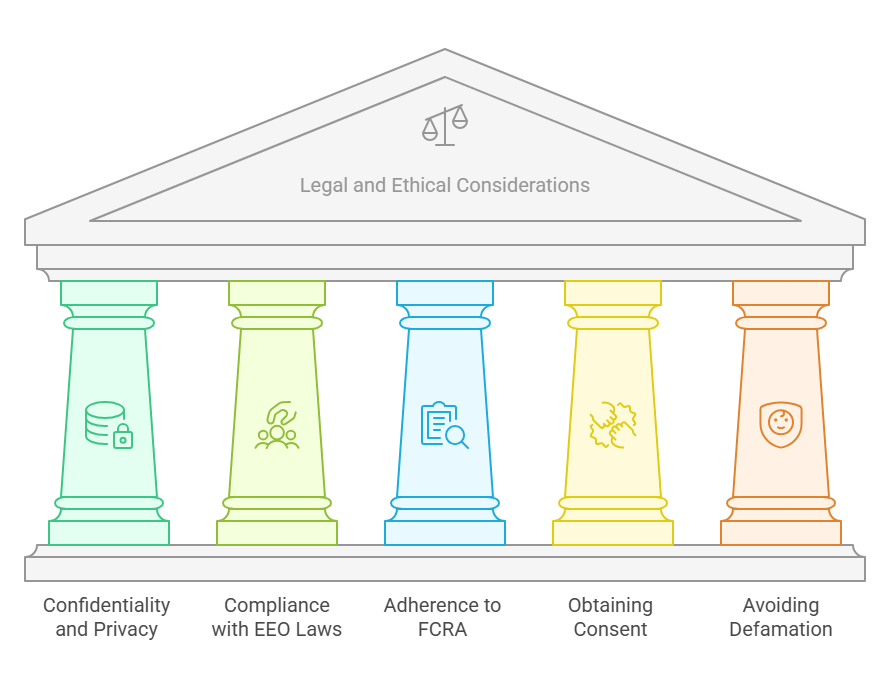
While reference checks are a valuable tool in the hiring process, they must be conducted with careful attention to legal and ethical guidelines. Employers must navigate several legal considerations to ensure they comply with employment laws and protect the rights of candidates and references. Here are some key legal and ethical aspects to keep in mind when conducting reference checks:
- Confidentiality and Privacy: It is essential to respect the confidentiality of both the candidate and the references. Information gathered during the reference check process should be kept confidential and used only for hiring purposes. Sharing this information with unauthorized parties can lead to legal consequences. Additionally, references should be aware of how their feedback will be used, and employers should avoid sharing the details of reference checks with other candidates or employees.
- Compliance with Equal Employment Opportunity (EEO) Laws: Employers must ensure that their reference check questions and practices do not discriminate based on race, gender, age, disability, religion, or other protected characteristics. The Equal Employment Opportunity Commission (EEOC) enforces federal laws prohibiting discrimination, and employers must ensure that reference checks align with these regulations.For example, avoid asking questions about a candidate’s personal life, such as their marital status, age, or religious beliefs. These types of questions are not relevant to the hiring decision and could be seen as discriminatory. Focus on questions related to the candidate’s professional qualifications and performance.
- Adherence to the Fair Credit Reporting Act (FCRA): The Fair Credit Reporting Act (FCRA) regulates the use of background checks, including reference checks, by employers. If you plan to use a third-party service to conduct reference checks or background checks, you must comply with the FCRA. This includes obtaining the candidate’s written consent before initiating the check, informing the candidate if their application is being denied based on the information obtained, and following proper procedures if a dispute arises regarding the information provided by the reference.
- Obtaining Consent: Before conducting any reference checks, always obtain the candidate’s written consent. This ensures that the candidate is aware and agrees to the process. In addition, it helps protect your organization legally if any issues arise later. Without consent, you risk violating privacy laws, and the candidate may even take legal action.
- Avoiding Defamation: References must be cautious about what they say to employers. Providing false or defamatory information about a candidate could expose the reference to legal liability. Employers should encourage references to provide honest, fact-based feedback, but also be mindful that negative feedback should be based on the candidate’s actual performance and not based on personal opinions or biases.
- Consistency in Applying Reference Checks: To avoid potential claims of discrimination or favoritism, ensure that reference checks are applied consistently across all candidates for a particular role. This includes using the same set of questions for each reference check and not singling out certain candidates for more detailed or different questions.
By adhering to these legal and ethical guidelines, employers can conduct reference checks in a way that is both effective and compliant with the law.
Frequently Asked Questions (FAQs) About Reference Checks
What are reference checks and why are they important?
Reference checks are when employers contact a candidate's previous employers or colleagues to verify their qualifications and abilities. They are important for confirming a candidate's work history and assessing their suitability for a role.
What are some essential reference check questions employers should ask?
Questions should cover general work performance, skills and qualifications, work ethic, interpersonal skills, leadership (if applicable), behavioral and cultural fit, and the reason for leaving.
How do reference check questions help evaluate a candidate's suitability?
They provide insights into a candidate's past performance, skills, and behavior, helping employers assess their fit for the role and company culture beyond what a resume or interview can reveal.
What are the benefits of conducting reference checks?
Benefits include minimizing hiring risks, verifying qualifications, assessing work style and compatibility, uncovering red flags, and improving employee retention.
What legal and ethical considerations should employers keep in mind when conducting reference checks?
Employers must consider confidentiality and privacy, compliance with Equal Employment Opportunity (EEO) laws, adherence to the Fair Credit Reporting Act (FCRA), obtaining consent, avoiding defamation, and ensuring consistency in applying reference checks.
Conclusion: The Importance of Proper Reference Checking Practices in Hiring
In conclusion, reference checks are a vital step in the hiring process, providing employers with valuable insights that can help guide their decision-making. When done properly, they can minimize hiring risks, verify qualifications, and assess whether a candidate is a good fit for your company’s culture and needs.
By asking the right reference check questions, adhering to best practices, and considering legal and ethical considerations, you can ensure that your reference check process is both effective and compliant. As part of this, leveraging services like Exact Background Checks can help streamline the process and ensure that your reference checks are conducted professionally, efficiently, and with attention to detail.
Ultimately, conducting thorough and well-structured reference checks helps employers make informed hiring decisions, leading to a more successful workforce and a better organizational fit.



